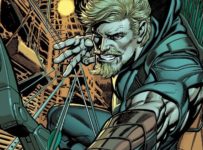The second and third entries in the Tales of Dunk and Egg complement each other so well that it's hard to imagine that they were published seven years apart. It wasn't until I came to The Mystery Knight that I could appreciate The Sworn Sword for what it is. I realise that a large part of this is because of the significance of the characters at play: in The Mystery Knight Dunk and Egg participate in activities that have some bearing on the future of the realm, while in The Sworn Sword they're performing pure acts of hedge knighthood.
The fault in my interpretation lies not in Martin but in myself; with a fuller understanding of the canon of these characters to date I came to enjoy myself much more than I had beforehand. That Martin's work can grow in retrospect as well as in the telling is something that I can get behind.
The Sworn Sword begins with Ser Duncan the Tall sworn to the service of Ser Eustace Osgrey during a drought. Dunk has to carefully negotiate a territorial dispute with the neighbouring Red Widow while realising that the colour of dragons maybe isn't as black and red as he had once believed.
The Mystery Knight finds Dunk and Egg taking a detour to attend a wedding that may actually be a recruiting ground for the treasonous. Sometimes these fellows have difficulty choosing their battles.
One of the best aspects of Tales of Dunk and Egg is the way that Martin provides the characters with a shared history without over or understating these adventures. By allowing at least a year and a half to have passed rather than simply trotting the two of them directly from The Hedge Knight, their relationship has been given some breathing space. As a team they've achieved a reasonable amount and fallen into a comfortable groove.
Unfortunately, a lot appears to have happened in the monarchy and seasons since then, and some of the timing gets confusing. Some things appear to have happened "two†years ago, which would technically be before Dunk and Egg met, let alone set off, but are presented as having occurred within the gap. Just shaking your head and accepting it sets it right, and a reread might clear it all in my mind.
The main issue with The Sworn Sword is that the most important material occurs in flashbacks rather than within the body of the narrative: the characters are dealing with the hangovers of the Blackfyre Rebellion some fifteen years previous. The squabbles between the characters, the ones that Dunk is unwittingly charged with ironing out, are petty compared to the issues that they've had in the past. What comes out most in The Sworn Sword, apart from the question of whether history should be written by the victors when the losers haven't been put to the sword, is the place of women in Westeros. Martin has made clear again and again that women in this society can have great intelligence and strategy, but they are not given the respect simply by the nature of their birth. Most of his best characters are women – even Cersei! – and Lady Rohanne Webber's brief appearance marks her as one of them.
It's only after reading The Mystery Knight that the significance of the Blackfyre Rebellion comes clear, and one can see precisely where Dunk was coming from in his reactions to the slightly banal present day events of The Sworn Sword. I always liked the character work in the story, but the whole thing clicked with me when I was furbished with further information. I would recommend reading these two stories in close succession.
The Mystery Knight itself is an overall more accomplished work, published in 2010 – approximately five years after A Dance With Dragons was originally going to be released. Writing it feels like he both allowed himself to let off some of the pressure and to release something that he truly knew about. Tales of Dunk and Egg are part of something epic without being epic themselves, and this feels like a truly important piece of canon work. The straightforward nature really helps here, where it might have hindered somewhat in The Sworn Sword. Not everything that Dunk and Egg do can or should bear some relevance beyond their characters, but here it does, and it works.
A large cast comes into play, and we get many facets of Dunk – and for once he doesn't have to get endlessly bailed out by Egg. He does his own legwork and his sense of honour comes to the fore in a satisfying fashion. I really enjoyed The Mystery Knight, even if its title seems to be more of a placeholder than anything else. I'm not yet sure if it's required reading, but having a more complete sense of both the Blackfyre Rebellion and the changing face of the Targaryen throne is definitely worthwhile.


